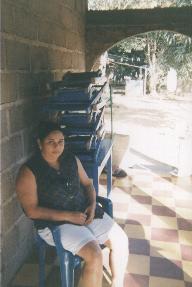 |
| Honduras Tries Prohibition To Stem Alcohol-Related Violence Punuare, Honduras -- There are no more hor dorves known as bocadillos, the sounds of guitar strumming mariachis have ceased. The blue chairs are stacked at an outdoor beer garden and the red-walled discoteque across the street is boarded up. Inside the former billiard parlor, groceries and the sound of video games have replaced the laughter of pool shooters. Since June 13 when a referendum was won by an overwhelming margin, bars have been banned here. Punuare was the first town to close its 20 pubs. Since then nine communities across Honduras have followed in adopting a prohibition on bars. Most of the communities are small like Punuare but the close-the-bar movement may eventually reach neighborhoods in the larger cities of Tegucigalpa and San Pedro Sula. The major impetus is alcohol-related violence. Punuare had four murders in early 1999 and a bar owner was slain in 1998, says Village Council President Jesus Figueroa. "Now there is no disorderly conduct, there's no shootouts, now there's no death of people. We've got the drunks working for their children not the bars." The referendums are the first attempt to make use of a law designed in 1994 by the Honduran Institute for Prevention of Alcoholism, Drug Addiction and Prescription Drug Dependence (IHADFA). "What we have is an honest majority that is seeing the destruction of their communities," says Fonseca. The drinking IHADFA contends is related to problems such as school dropout, family disintegration, violence and other crime. The idea is to allow community pressure to be brought to an area where municipal enforcement has always been lacking. Honduras, a nation of 5.5 million has an estimated 300,000 excessive drinkers. Some 50,000 are considered alcholics. "Every weekend we have a lot of people jailed, a lot of people in the hospital and a lot of people ending up in the cemetery," says Angel Adan Fonseca, legal counsel to IHADFA and promoter of the referendums. A 1992 study of drug use in Honduras found that of every 10 murders six were related to the consumption of alcohol. Bar patrons are being trounced in the elections with the measures passing by a margin of 95%. In Punuare the vote was 675 to 15. Nevertheless drinkers continue to find ways to share a trago and socialize. In Punuare residents report that town drinkers travel to nearby villages to buy alchohol and then return to Punuare to drink in the park or in front of the closed bars. In recent months the most common drink has become a Pepsi bottle filled with sugar cane alcohol known as guaro. Former bar owners also bemoan the loss of income from alcohol sales and say the movement is fueled by egomania. "Every week I bought 10 cases of beer. I made 1,000 Lempiras (´$70) on the weekend," says Marina de Ochoa. "The money went to send my children to the university." Now Marina and her husband Rosendo are trying to make it through the year selling groceries bought with a 5,000 Lempira ($357) loan from the nearby Department Capital of Juticalpa and a percentage of the video game profits made from several rented machines. Marina notes that those promoting the referendum promised there would be new money invested in town and new sources of employment. "Where's the money and jobs?", she asks. Nearby bar owner Maria Moya says "If we had that kind of business it's because we had to work. This is what we lived from and these people promised to help us and they aren't helping us in anyway. This was a pure sickness and egoism. They didn't do it to better the drunks but for selfish reasons." IHADFA admits that the measure could back fire if prohibition produces an increase in use of homemade sugarcane and fruit based brews which have high lead content and sometimes can cause blindness. "Its a double-edged sword," says Ramon Bentancur of the IHADFA Document Center. But village leaders like Figueroa feel the health risks associated with bootlegging are worth taking. "Wherever there are bars they should close them," he says. "Its the road to a better life." ### |
 |
 |
| Marina and Rosendo Ochoa have been forced to end their beer sales following a town referendum which made Punuare a dry town. |
| Maria Moya says ambitious politicians forced her to close her popular bar in Punuare. |